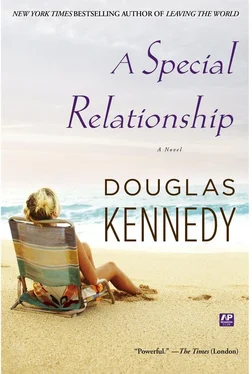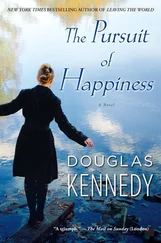'I'm doing fine', I said.
'Without question. Your progress has been tremendous. But surely, you can afford a month or two of full-time nannying, just until you're at a stage where' -
But when I argued that I could easily handle my son - especially as he was still at the non-mobile stage of development - she said, 'I sense you're still feeling guilty, aren't you? And still thinking that you have to prove to the world that you are a competent mother'.
I shrugged, but didn't say anything.
'As I've been telling you since the start of our sessions together, there's absolutely nothing wrong with admitting that you can't cope with certain situations...'
'But I am coping now'.
'And no one's trying to contradict that. But you're also in the controlled environment of a hospital - where all meals are provided, somebody changes the bedclothes, and prepares the formula for Jack, and looks after him at night while you sleep...'
'Well, the cleaner will be able to do most of that for me - with the exception of the nights. And if he starts ruining my sleep again, I can always nap while she's on duty'.
'All right, that may be so - but I still get the feeling that there's a certain remorse about' -
'Did Agnes feel terribly guilty about... ?'
She looked at me carefully.
'About what?'
'About failing her son and her husband'.
'I can't talk about another patient. But... do you think about Agnes often?'
'All the time'.
'Did you become close while you were sharing the room?'
'Hardly - since I was so out of it. But... of course I think about her a lot. Because...'
I faltered. So Ellen asked, 'Because you wonder if you'll end up under an Underground train yourself?'
'Yes', I said. 'That's exactly what I wonder'.
'All I will say is what I said to you before', Ellen said. 'Agnes left before any of the hospital staff felt she was ready to leave. You, on the other hand, are leaving with our medical approval. Because we feel you're ready to get on with life again'.
'You mean, this isn't life?'
For the first time since we started out sessions, I actually managed to make my therapist laugh.
But before they sent me back to 'life', there was an extended question-and-answer session with Dr Rodale, whose primary concern was getting the ongoing pharmacological load just right. So she wanted to know every detail about my current sleep patterns, my diet, my mood swings, my sense of calm, my sense of unease, my sense of ease with Jack, my sense of ease with Tony.
'Oh, I'm certain my husband will revert to type as soon as I'm home... now that I seem to be back in the rational world'.
'So that submerging feeling you often described to me... what was the term you used again... ?'
'The black swamp'.
'Yes. The black swamp. Do you often feel yourself drawn back there?'
'Only when the previous dose of anti-depressants is starting to wear off'.
She nodded - and informed me that she wanted to ever-so slightly increase the dosage to ward off those lapses.
'Does this mean I'm going to be on anti-depressants for the foreseeable future?' I asked.
'It looks that way. But if they help you cope...'
Ah yes, so this was what I had become: a woman who needed help coping...
Still, Dr Rodale finished our session by saying that she was genuinely delighted with my recovery.
'Yours is the sort of story which helps counterbalance...'
Stories like Agnes's?
Then she told me that I could leave anytime I was ready to leave.
And so, the next morning, Tony showed up with the car around ten. Nurse Patterson was off-duty, but I'd thanked her the night before. I also thanked Ellen and Dr Rodale, having agreed to see Dr Rodale in two weeks to discuss my ongoing relationship with anti-depressants. Ellen offered me the chance to continue our sessions. I took her number and said I'd think about it. When I mentioned Ellen's offer to Tony, he said, 'Well, if you need to pay someone to tell them what a bad husband I am, go right ahead'.
As usual, this comment was delivered in a sardonic tone. But I sensed there was also a hint of guilt behind it.
Still, his comment did have the effect of transferring whatever guilt he felt on to me - and certainly didn't make me want to stretch the family finances any further by doling out £70 an hour to a therapist. My condition had stabilized, after all. The drugs were working. And if I needed to talk my dumb head off, there was always Sandy at the end of a transatlantic phone line. I was going to be just fine.
But within five days of my homecoming, Tony reverted to type.
All credit to Jack: he behaved like the perfect gentleman during his first days in Putney. He slept for five solid hours at a go. He slurped down five bottles. He didn't complain about the service, or the newness of his bedding, or the strange surroundings. Tony seemed reasonably content in his company, just as he also did low-key solicitous things like sterilizing and preparing several bottles, and even changing his diaper on two occasions. No, he didn't take the night shift when Jack woke at three am... but he did insist that I grab a nap the next afternoon while he kept an eye on the boy.
But then, after those first few days, he had to go back to the paper - and his return to work also marked the beginning of a distancing process. He started to come in late - nine, ten, even eleven. Then, one night, he called me from the Groucho Club around one-fifteen in the morning, telling me that a dinner with some Chronicle colleagues was running just a little late.
'Fine, no problem', I said. 'And the way Jack is going tonight, I'll probably be up when you get home'.
When he rolled in at five, I certainly was still wide awake - balancing Jack on my lap, trying to negotiate him through a particularly bad dose of colic, watching CNN. Tony was drunk. Seriously drunk. And not pleasant.
'What are you, my mother... ?' he asked, staring at me with unfocused eyes and equally unfocused contempt.
'I was just up with Jack', I said, maintaining a low, subdued tone of voice.
'Well, I am not your fucking child', he said, the words slurring. 'And I don't... don't... like the idea of being... I mean, the fucking nerve of you, waiting up for me, like I'm some truant...'
'Tony', I said quietly. 'Go to bed'.
'Don't you tell me...'
'Go to bed'.
He looked at me, his eyes blinking with dim bemusement. Then he turned and staggered upstairs. Shortly thereafter, Jack finally conked out. I took him to the nursery, and then went to my room. My husband had fallen facedown on our bed, covering the entire span of it with his rumpled body. I threw a blanket over him, and unplugged the baby alarm, and brought it with me as I climbed the stairs to Tony's study, and pulled open the sofa bed, and found the duvet, and climbed under it, and fell asleep.
Then there was light in my eyes, and Tony was by my side, proffering a cup of coffee. Even though it took a few moments for my eyes to come into proper focus, I could see that he looked terrible... and terribly guilty.
'I think I owe you a very large apology', he said.
'You were drunk', I said, sounding absurdly benign.
'I was beastly'.
'Thank you for the coffee', I said, smiling sweetly.
One of the more intriguing aspects of Life on Anti-Depressants was the way it eventually whittled away all rough edges, all potential sharp emotional corners, and left you feeling curiously placid about much of the shit that life can throw at you. The doctor was right - its effects were cumulative. Though I was already registering its increasing efficacy while I was still in hospital, its tranquillizing benefits were only really beginning to kick in now that I was back on the proverbial home front. What struck me most forcibly was how the anti-depressants had softened so much of my natural contrariness; my instinctive need to talk back when challenged. It's not as if I had suddenly become programmed into robotic, hubby-worshipping complacency. Rather, I felt like I'd been dispatched to a torpid, tropical place where the general rule of behavioural thumb was: who cares? I was no longer in South London; I was beached on some super-laid-back, ganja-hazed island where all of life's vicissitudes were greeted with a stoned shrug.
Читать дальше












